Staff Inquiry: It’s Good To Be Bad – Our Favorite Villains
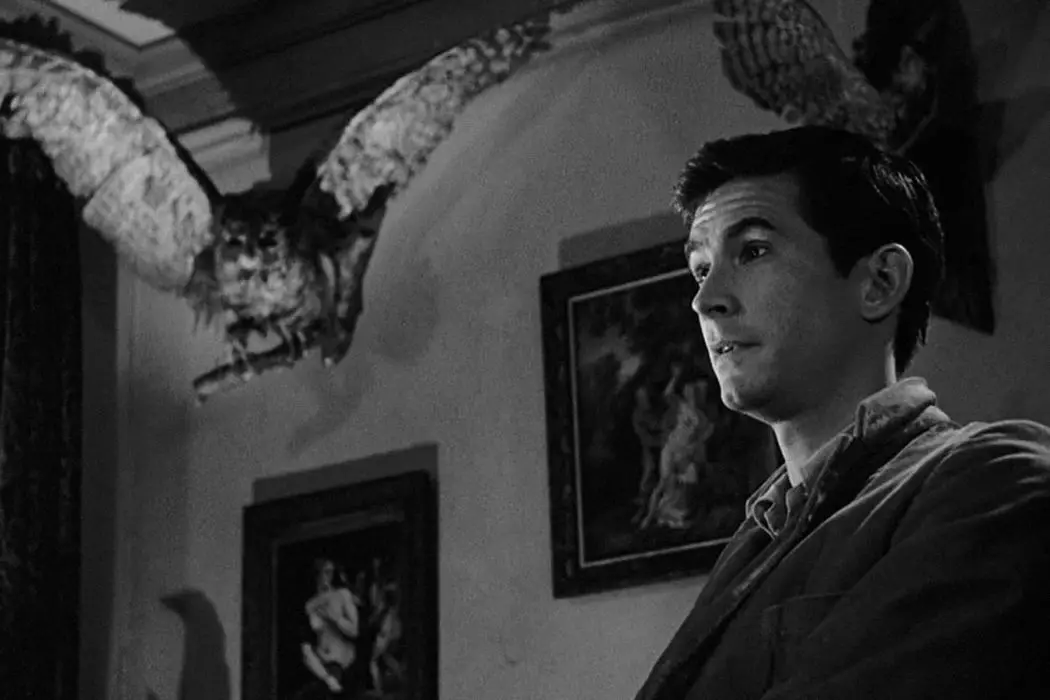
Alex is a film addict, TV aficionado, and book lover.…
They are the scoundrels, the miscreants, the agents of chaos, and you can’t keep your eyes off them. Villains are a make-or-break element of movies, a dynamic force prodding the other characters along. Weak ones can leave films struggling to maintain momentum, but strong ones can lift them into the upper echelons of movie history. I mean, how many infamous lines have been uttered by a great villain, and how many of the fiends stick in your head long after the credits role?
We here at Film Inquiry have a lot of them rattling around in our brains, so we couldn’t limit ourselves to just one. That’s right, it’s another round of top tens, with each person getting ten precious slots and one special pick to wax poetic about. What draws people to a particular villain can be pretty revealing, so don’t judge our dark sides too harshly.
Without further ado: our favorite villains!
Tynan Yanaga – Mr. Potter, It’s a Wonderful Life
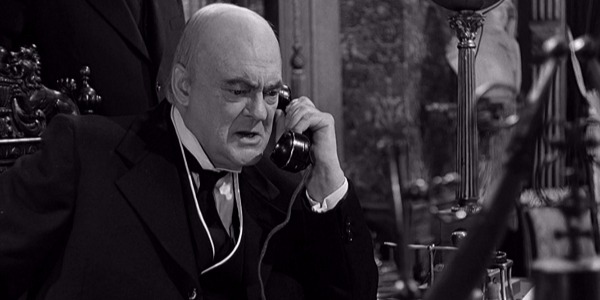
A superior villain is one of the finest gratifications of a quality movie. A weak one causes any movie to topple pathetically because there’s no central conflict to prop it up. And the best villains subvert the archetypal Snidely Whiplash caricatures twirling their mustaches and looking to unleash their dastardly schemes on an unexpecting world. But alas, Darth Vader is already bequeathed the honor, and so I must forego my Star Wars obsessed childhood and pick someone else.
The ones that remain compelling to me are fallen human beings. They can be psychotic like a Joker or a Norman Bates or just plain corrupt and callous autocrats. They let their own avaricious ambitions and their ambivalence toward the plight of their fellow man dictate their existence. Thus, one of the finest examples of all time would have to be the crotchety tyrant Mr. Potter as played by Lionel Barrymore in It’s a Wonderful Life, continuously scowling and barking at all the pitiful plebeians in his presence. He’s so smug in his victories over George and so bitter in defeat.
If George Bailey is the champion of all that is sacrificial and compassionate then Potter is his utter antithesis. Both men want to leave their mark on the town of Bedford Falls but while George Bailey relies on his friends and considers their well-being, Mr. Potter tries to control everything and everyone with his financial capital. And I think he’s a deliciously malevolent villain because his corruption makes Bailey’s humanity all the more apparent. That juxtaposition provides the moral framework of the film, and without Mr. Potter, the film’s depths would not be as devastating nor the Christmas crescendos so enrapturing. We have him to thank for making this perennial favorite a definitive classic with universal implications.
The rest of Tynan’s top ten: Darth Vader (Star Wars), The Joker (The Dark Knight), Norman Bates (Psycho), Hannibal Lecter (The Silence of the Lambs), Phyllis Dietrichson (Double Indemnity), the Alien (Alien), Nurse Ratched (One Flew Over the Cuckoo’s Nest), The Wicked Witch of the West (The Wizard of Oz), Goldfinger (Goldfinger)
Benjamin Wang – Henri Verdoux, Monsieur Verdoux
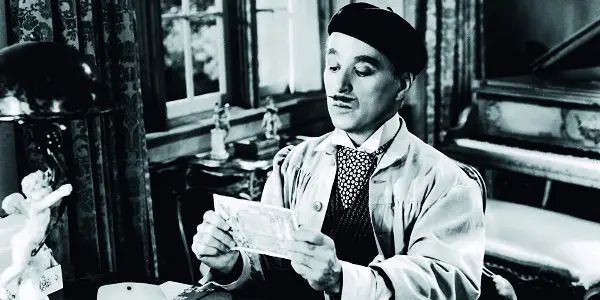
1947’s Monsieur Verdoux is about a serial killer named Henri Verdoux who steals his victims’ fortunes and uses them to play the stock market. Though the film is a comedy in many ways, it’s quite sober about its grim premise. Charlie Chaplin once said he would not have made his 1940 film The Great Dictator if he had known the full extent of the atrocities committed by the Nazis in World War II; perhaps this is one reason why Monsieur Verdoux, his next feature, was so dark.
With this in mind, it’s notable that Monsieur Verdoux employs documentary footage from Nazi Germany in a climactic sequence representing the massive upheaval caused by World War II – Verdoux is not the only killer in the film. It’s one of many devices the film uses to explore how both acts of kindness and acts of cruel violence reverberate over time and space. Chaplin said his intention with Monsieur Verdoux was not to condemn crime, but to understand it.
So, he plays Henri Verdoux as not-quite-a-psychopath. Verdoux is remorseless and monstrous, but at some fleeting points, it seems like there might be something deeper to his personality. There are hints that he does have moral standards of some kind, but he’s been so thoroughly poisoned against the world that nothing lives up to them in his eyes.
He remains detached in all situations, but behind his detachment is a contempt deeper than almost any that’s ever been portrayed in a film. He regards everything so poorly that there’s only one thing that satisfies him: playing his game of fabricating identities and choosing the perfect time and method for each murder. But as he eventually points out himself: of all the killers in the film, he doesn’t have the highest body count.
The rest of Benjamin’s top ten: Irma Vep (Les vampires), Albert Brooks (Real Life), Eboshi (Princess Mononoke), General Jack Ripper (Dr. Strangelove), Don Logan (Sexy Beast), Kumiko (Noriko’s Dinner Table), Jack Torrance (The Shining), Dr. Mabuse (Dr. Mabuse, der Spieler), Vincent (Collateral)
Kristy Strouse – Darth Vader, Star Wars
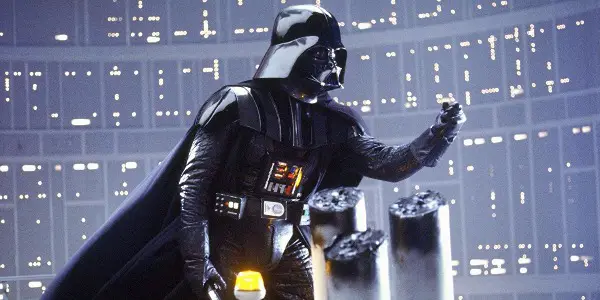
I think everyone can agree that the best villains are the complex ones, when there is a meaning and reason for their actions. They have to be more than just bad. There are many fabulous villains, in some of my favorite films, that I didn’t include. I wanted the list to be as diverse as possible.
Darth Vader is epic, and that’s why he’s my number one.
Firstly, I have to point out that I’m a huge Star Wars fan. It was a staple of my childhood and was enormous in shaping who I am now. While the prequels weren’t nearly as incredible as the original three, the final (Revenge of the Sith) gave us the transformation of Anakin Skywalker into Darth Vader, and with that one of the most well-known villains of all time was created.
Toss aside his notoriety or the success of the franchise, because popularity isn’t part of this (though he is iconic). Within the Star Wars universe, Vader terrifies and is feared all over the galaxy. Everyone knows his name,and that he is ruthless and powerful. Most importantly, he was once the strongest Jedi, and his emotion, his love (which leads to hate) is what turned him to the dark side. The fear of losing those he cared about and the desire for power pushed him to evil. Providing us with that backstory humanized him and made his final sacrifice that much more meaningful. His redemption gave him layers under that intimidating physical demeanor.
From his first introduction in A New Hope to his most recent (and possibly the most badass scene in the movie) spot in Rogue One, this imposing character defined what it was to become a villain.
The rest of Kristy’s top ten: Anton Chigurh (No Country for Old Men), The Joker (The Dark Knight), Hans Landa (Inglourious Basterds), Bill The Butcher (Gangs of New York), Hannibal Lecter (The Silence of The Lambs), Annie Wilkes (Misery), Voldemort (Harry Potter), Loki (Thor), The Overlook Hotel and by extension Jack Torrance (The Shining)
Robb Sheppard – Commodus, Gladiator

A great villain once said; “Everybody loves the bad guy!”
Well, if that’s the case, then the bad guy isn’t doing it right. A truly great villain shouldn’t make you want to dress like them, perform impressions of them or cheer them on. A true villain should be completely and utterly deplorable. Enter, Commodus.
As portrayed by Joaquin Phoenix, Gladiator’s Commodus is a conniving, cowardly, and cutthroat autocrat who would just as soon cop off with his own sister as he would commit patricide and regicide in order to become Emperor. His longing for power is matched only by his blood lust; he’s never more ecstatic than when the blood of his subjects is being spilt in the Coliseum. Even when projecting the perception of bravery by challenging his nemesis, his snidey shanking of Russell Crowe’s Maximus before entering the arena for a ‘fair fight’ makes it all the more satisfying when he finally gets his throat slit at the hands of the vengeful gladiator. In that moment, one would assume that many a viewer punched the air in celebration. But perhaps not; what kind of person would take such delight in the death and destruction of another. Oh, wait a minute. Now say goodbye to the bad guy.
The rest of Robb’s top ten: Grand Moff Tarkin (Star Wars), Amon Goeth (Schindler’s List), Percy Wetmore (The Green Mile), Nurse Ratched (One Flew Over The Cuckoo’s Nest), Carter J. Burke (Aliens), Dr. Frederick Chilton (The Silence of the Lambs), The Child Catcher (Chitty Chitty Bang Bang), Alex Forest (Fatal Attraction), Dwight Hansen (This Boy’s Life)
Linsey Satterthwaite – Norman Bates, Psycho

One of the greatest tricks a movie villain can do is to make you feel empathy for them. They draw you in and just as you are feeling compassion for their plight, they hit you with their own brand of nastiness and make you rethink everything. Nowhere is this more evident than in Psycho and with Norman Bates, whose turn from shy motel caretaker to Oedipus-fuelled killer is one of cinema’s greatest sucker punches. When we first meet Norman, he appears to be the sweet boy next door; his awkwardness around Marion Crane’s arrival is endearing though it is laced with a bittersweet impending threat. And then the timid mouse turns into the cat, waiting and watching its prey, letting the audience into his deviant pastime as the unsuspecting Marion settles into the Bates Motel.
As modern audiences, we all know the twist in Hitchc*ck’s iconic slasher pic; however, this does not lessen its impact, and this is down to Anthony Perkins’ portrayal of Norman Bates. He used his matinee good looks and turned them on their head, offering a gangly, off-kilter character who took the idea of keeping it in the family to its extreme. Perkins never escaped the shadow of his seminal creation, but his curse was cinema’s gift. His villainous Bates has terrified audiences through the ages, and that killer grin in the final scene confirms to the audience that, despite the psychological intervention, he will always be a mommy’s boy.
The rest of Linsey’s top ten: Mrs Carmody (The Mist), The Government (E.T.), Jareth the Goblin King (Labyrinth), Amy Dunne (Gone Girl), Hans Landa (Inglourious Basterds), The Nazis (Indiana Jones), Anton Chigurh (No Country for Old Men), Hans Gruber (Die Hard), Jack Torrance (The Shining)
Alice Murray – Hans Landa, Inglourious Basterds
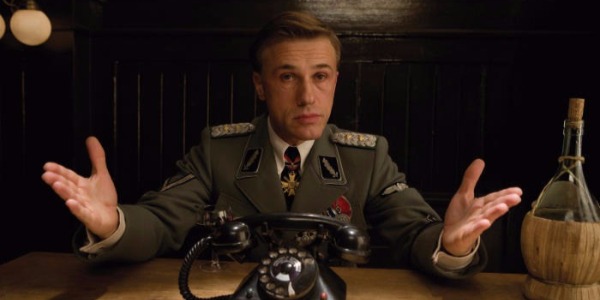
When I think of all the memorable villains in film, I’m mostly mesmerised by the charming ones. There’s something fascinating about the hustle of a highly social character who so obviously draws in their victims. There’s no need for lurking in dark shadows or deviously plotting your conflicts when you’re the master of enticement and you can outsmart just about anybody. Christoph Waltz as Colonel Hans Landa in Quentin Tarantino’s Inglourious Basterds is the most perfect example of this: a captivating psychopath of the silver screen.
Winning an Oscar for portraying the cunningly evil Nazi Colonel, Christoph Waltz steals the show in this alternative World War 2 epic. But what is it about this character that makes him so prominent?
His impeccable talent of being able to switch consistently between three different languages plays a massive part in his victories as an actor and as a character. In some ways, he could almost be likened to an animated cartoon; complete with a scarily wicked grin and a sinful, matter-of-fact vulgarism.
Until I watched the 17-minute opening, I could never have comprehended that a single conversation between two characters at a table could be so incredibly intense. The way that Waltz shifts his facial expressions to almost befriend his victims and keeps hold of his dark intentions right until the very end is the ultimate absorbing tool; reeling you in from the very start.
Inglourious Basterds is full of scenes and moments similar to this. For instance, the gag-worthy scene where Shoshanna Dreyfus (Melanie Laurent) is forced to have dessert with Landa and the eerily edge-of-the-seat scene where Landa interrogates Bridget von Hammersmark (Diane Kruger) about a high heel shoe. But perhaps none is as effective as that first scene, which single-handedly won Christoph Waltz – an entirely unknown, breakthrough actor from Vienna – his Academy Award for Best Supporting Actor.
The rest of Alice’s top ten: Calvin Candie (Django Unchained), Amon Goeth (Schindler’s List), Henry Potter (It’s A Wonderful Life), Nurse Ratched (One Flew Over The Cuckoo’s Nest), Tommy De Vito (Goodfellas), Bill Cutting (Gangs Of New York), Dolores Umbridge (Harry Potter), Amy Dunne (Gone Girl), Terrence Fletcher (Whiplash)
Stephanie Archer – The Joker, The Dark Knight
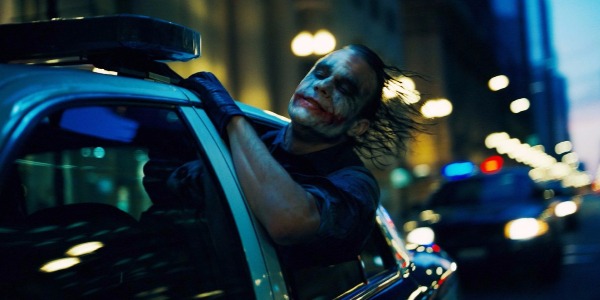
“Why so serious?” This memorable phrase from Christopher Nolan’s The Dark Knight should be a line all villains have the chance to utter – it is to much fun to be bad. Heroes are focused on saving the girl and righting the wrongs of the world, while villains spend their time just being bad (some even down right evil).
The Joker is the ultimate villain, a man driven by his ability to exploit the dire situations of others, as well as clever enough to stay just one step ahead of everyone around him. His carefree look on life allows him the freedom to break the rules without any regard of consequences – he is as Alfred describes “a man who just wants to watch the world burn”.
He demands a large portion of the collective pot belonging to the mob in exchange for securing their safety and freedom – yet burns his and their portions to the ground. He forces Batman to choose between Harvey Dent and Rachel knowing the choice Batman will make, and the inevitable consequences of that decision. While Gordon may have gotten the slip by tricking him into thinking he was dead, The Joker already had a plan in motion to be captured (no matter the players) and devised his ingenious escape. He revels in the knowledge that he has the upper hand, that he is unpredictable, and in the reactions of those who find his actions and mannerisms shocking.
Also a prodigy of psychology, the Joker could give any profiler a run for his money. He knows how an individual thinks, acts, and responds thus able to put out intricate plans that can not only be successfully set into motion, but also be completed to his liking. The bank robbery in the beginning of The Dark Knight could have gone terribly array with so many players involved. Yet, the Joker knew how each would respond to their own greed and the presumed security of payment. Each did as they were told in the sequenced order that was laid out – leaving the Joker as the last man standing. Even when a courageous banker tries to be the hero, his actions were anticipated and swiftly snuffed out. You could say the Joker took out the pin in his heroism.
Though, when it comes to any villain within a film, the success of the character is largely due to the actor chosen to bring him or her to life. Many of my favorite villains on and off this list are portrayed by the same actor (I.e. Alan Rickman, Gary Oldman, and Tom Hardy). They each bring resounding and memorable performances to the villains they play. With the Joker, it needs to be said that the success of this villain is not just due to script and direction, but largely to the performance delivered by the late Heath Ledger. His dedication, both body, mind and soul, brought to life a fully embodied character that will stand the test of time and will forever be the true Joker.
The rest of Stephanie’s top ten: Bane (The Dark Knight Rises), Freddie Krueger (A Nightmare on Elm Street), Darth Vader (Star Wars), Hans Gruber (Die Hard), Hannibal Lecter (The Silence of the Lambs), Ghost face (Scream), Bronson (Bronson), Sheriff of Nottingham (Robin Hood: Prince of Thieves), Scarecrow (Batman Begins)
Those are our favorite villains! Who do you love, who did we miss, and what would be your top ten? Let us know in the comments!
Does content like this matter to you?
Become a Member and support film journalism. Unlock access to all of Film Inquiry`s great articles. Join a community of like-minded readers who are passionate about cinema - get access to our private members Network, give back to independent filmmakers, and more.
Alex is a film addict, TV aficionado, and book lover. He's perfecting his cat dad energy.













